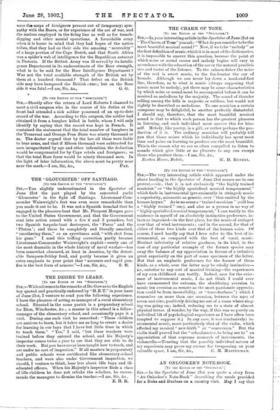THE CHARM OF TONE.
[To THE EDITOR OP THE "SPECTATOR.1 Sia,—In your interesting article in the Spectator of June 21st on n The Charm of Tone ". you ask: "What do you consider to be the most beautiful musical sound ?" Now, if we take "melody" as the first definition of music, which it is in most of the dictionaries, it is impossible to answer this question, because the point at which noise or sound ceases and melody begins will vary in accordance with the education of the ear or the natural proclivi- ties and tastes of the listener. To the salmon-fisher the noise of the reel is sweet music, to the fox-hunter the cry of hounds. Although we can never lay down a bard-and-fast line, therefore, as to what is music (always supposing that music must be melody), yet there may be some characteristics by which noise or sound must be accompanied before it can be received as melodious by the majority. The sound of thunder rolling among the hills is majestic or sublime, but would not rightly be described as melodious. To one musician a certain composer may be delightful, to another perfectly distasteful. I should say, therefore, that the most beautiful musical sound is that to which each person has the greatest pleasure in listening, and each individual must answer this for him- self. Melody, like poetry, is a gift, or rather perhaps the pro- duction of it is. The ordinary musician will probably tell you that those noises which ho individually has spent most time and pains on learning to produce are the most beautiful. This is the reason why we are so often compelled to listen to sounds which give little or no pleasure to any one except those who produce them.—I am, Sir, &c., Newton Honer, Bedale. W. D. RUPELL.


















































 Previous page
Previous page